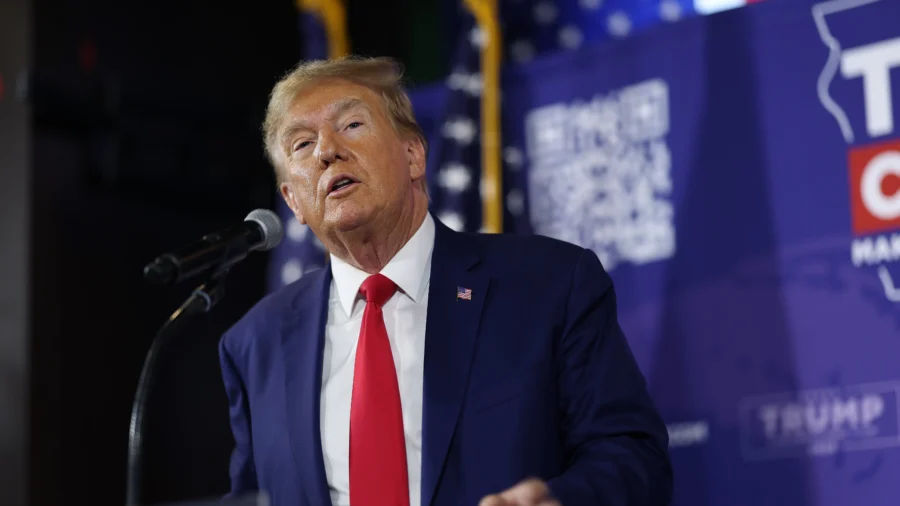Former President Donald Trump is seeking permission to appeal to New York’s highest court a decision that reinstated a gag order in his civil fraud case in the state, a court filing showed on Monday.
Monday’s court filing marks the latest development in President Trump’s civil bench trial that’s entering its tenth week, in which he’s accused of unlawfully inflating assets to gain business advantages.
Judge Arthur Engoron, who presides over the trial, initially imposed the gag order on President Trump on Oct. 3 after the former president accused Ms. Allison Greenfield, the judge’s top law clerk, of political bias against him in a post on Truth Social, pointing to a picture of Ms. Greenfield standing beside Democratic lawmaker Rep. Chuck Schumer (D-N.Y.). The post left the court “inundated” with threats from supporters of President Trump, Judge Engoron said in a court filing.
The gag order prohibits President Trump and his lawyers from making public statements about Judge Engoron’s court staff. An associate judge in the New York Supreme Court, Appellate Division, a mid-level appeals court, temporarily suspended the order on Nov. 16, two weeks before a four-panel judge in the same court reinstated the order.
Monday’s filing shows that President Trump’s lawyer, Clifford Robert, asked the mid-level appeals court on Sunday to permit President Trump to appeal the reinstatement of the order to the New York Court of Appeals, the state’s highest court.
“Without expedited review, Petitioners will continue to suffer irreparable injury daily, as they are silenced on matters implicating the appearance of bias and impropriety on the bench during a trial of immense stakes,” wrote Clifford Robert, an attorney for President Trump, in the request dated Dec. 3.
Mr. Roberts contended that the mid-level court, by reinstating the order, “has bestowed on Justice Engoron an absolute, unfettered power to punish Petitioners for validly objecting to demonstrable partisan bias on the bench.”
Attorneys for President Trump have argued in court filings that the gag order violates his free speech rights and injures the former president’s ability to campaign, as the current Republican frontrunner, by restricting him from talking about a case he says was brought against him as a political weapon.
In another filing on Nov. 25, the former president’s lawyers acknowledged the security risks of the threats against Judge Engoron but argued that this risk alone does not justify limiting the former president’s speech.
“At base, the disturbing behavior engaged in by anonymous, third-party actors towards the judge and Principal Law Clerk publicly presiding over an extremely polarizing and high-profile trial merits appropriate security measures,” Trump’s attorneys wrote. “However, it does not justify the wholesale abrogation of Petitioners’ First Amendment rights in a proceeding of immense stakes to Petitioners, which has been compromised by the introduction of partisan bias on the bench.”
The former president has already been fined and has paid $15,000 in violation of the gag order.
Allegations of Bias
President Trump has characterized Judge Engoron as “Trump-hating” in posts on Truth Social, and his lawyers requested a mistrial last month on the basis that the trial was “tainted” by the political bias of the judge and Ms. Greenfield.
The court has “impermissibly exceeded its discretion” by giving Ms. Greenfield “unprecedented status and input” in the trial, the lawyer alleged in the request for mistrial, accusing the judge of “co-judging” the case with his clerk.
“Only a judge, not an unelected staff member, may exercise judicial authority under the New York Constitution, and the People of New York declined to elect the Principal Law Clerk when she ran for office,” the motion reads.
Ms. Greenfield had previously run for Manhattan Civil Court in 2022. President Trump’s lawyers criticized her as “partisan,” noting that she has given political campaign contributions to Democrats exceeding $500 per fiscal year, in violation of New York court ethics rules.
They also criticized her judicial philosophy, pointing to her saying, “I think it’s incredibly important to consider, what would the people who elected me want me to do and is there any precedent … that would allow me to achieve that outcome,” which they argue runs “contrary” to being “faithful to the law.”
The Epoch Times has contacted the New York Attorney General’s office, which brought the case against Trump and his family real estate company, for comment.
Catherine Yang contributed to this report.
From The Epoch Times

